7 Pembrokeshire Coast Path Locations You Should Know About
By Mark Wright
Walking the Pembrokeshire Coast Path is a magnificent adventure. Stretching 186 miles from Amroth to St Dogmaels this stunning coastline showcases some of the most breathtaking scenery in the UK. The path journeys over dramatic cliffs, along secluded beaches, and through lush green landscapes, rewarding walkers with ever-changing views of the sea and surrounding countryside. From iconic landmarks like the Green Bridge of Wales to picturesque towns and villages such as Tenby and Solva, the Pembrokeshire Coast Path delivers a visual feast at every turn.
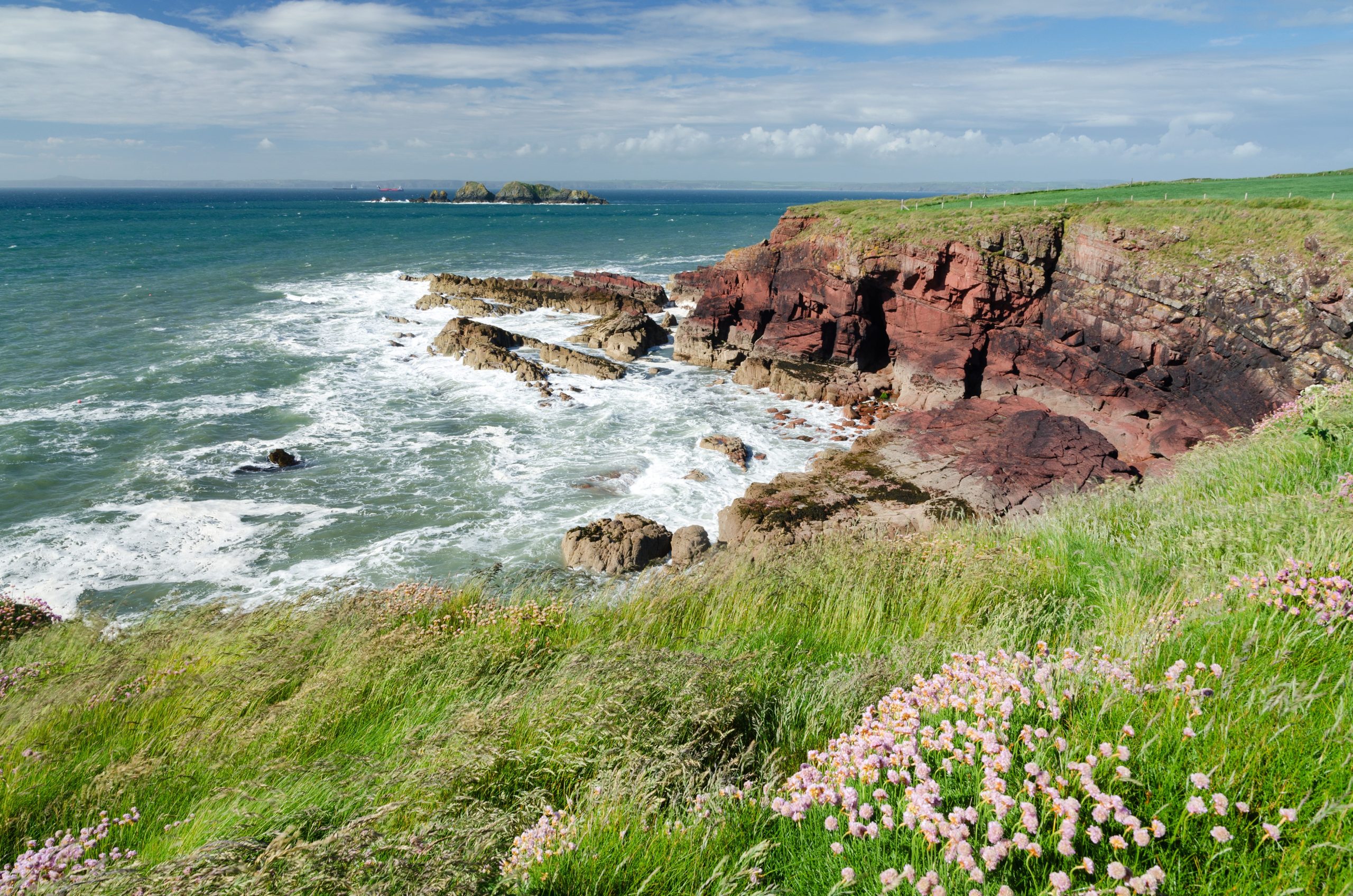
Pembrokeshire’s coastline is a geological treasure trove, with rock formations shaped by centuries of erosion. The path is also a haven for wildlife enthusiasts. Walkers can observe a diverse range of seabirds and marine life. The surrounding habitats also support a variety of plants and animals.
The path passes through charming villages, historic sites, and landmarks that offer a glimpse into the region’s rich heritage. Discover ancient burial chambers, medieval castles, and traditional fishing communities along the way.
Walking the Pembrokeshire Coast Path is a journey of discovery that immerses you in the natural and cultural wonders of Wales. Whether you’re seeking solitude, adventure, or inspiration, the Pembrokeshire Coast Path serves up a truly memorable experience.
To further whet your appetite we’ve compiled our list of 7 Pembrokeshire Coast Path Locations You Should Know About.
St David’s Head
St David’s Head is one of the most iconic and breathtaking sections of the Pembrokeshire Coast Path. This rugged headland is located just a few miles northwest of the cathedral city of St Davids, the smallest city in the UK.
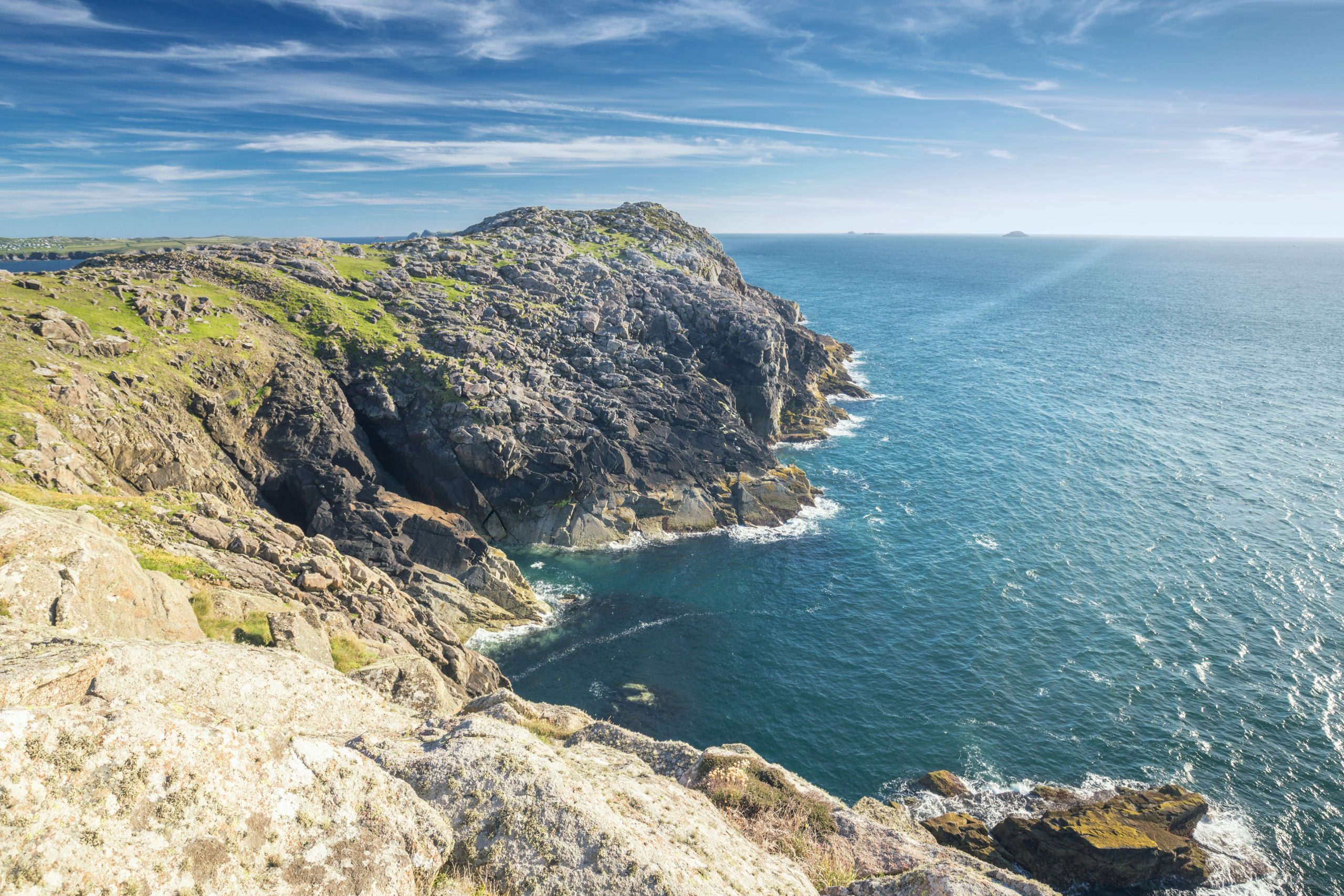
The area boasts a rich geological history, with the cliffs composed of ancient volcanic rock giving the landscape a striking appearance. The headland is also home to various plant species, including rare coastal wildflowers and heather.
Walking the path along St David’s Head offers breathtaking views of the sea and coastline, and you are likely to spot a number of seabirds including guillemots and razorbills. The headland also provides ample opportunities for wildlife spotting. Grey seals can often be seen basking on the rocks below, and dolphins are sometimes visible in the distance
Keep an eye out for the historic sites scattered along the route, including ancient burial chambers such as the Coetan Arthur, a Neolithic dolmen. This burial chamber, with its massive stone capstone, is a testament to the area’s fascinating prehistoric past.
Barafundle Bay
Barafundle Bay is one of the most enchanting and picturesque locations on the trail. This secluded beach, often considered one of the most beautiful in the world, is nestled between limestone cliffs and is only accessible by foot, adding to its charm and allure.
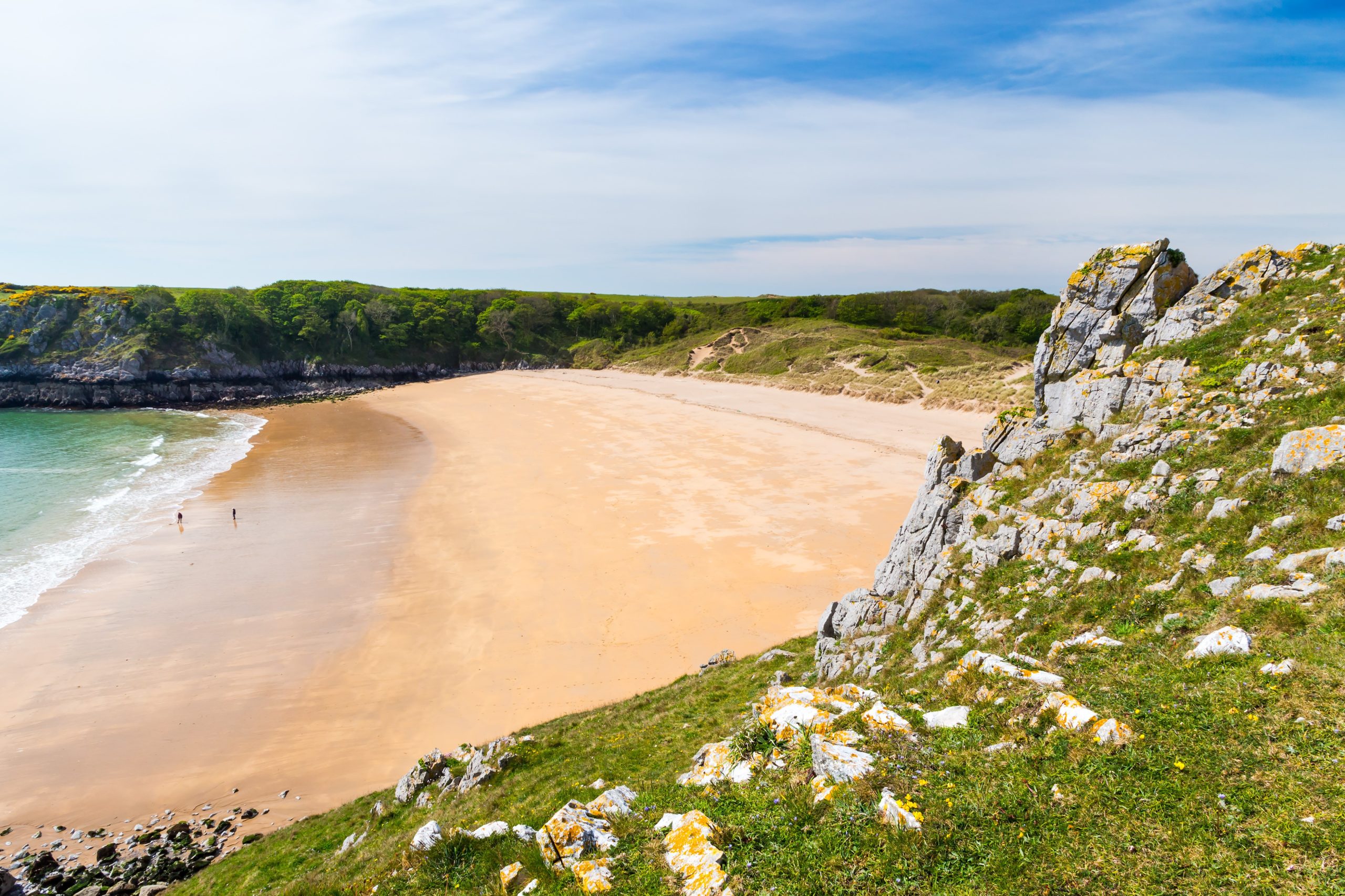
The bay is renowned for its pristine, golden sand that gently slopes into the turquoise sea. Surrounded by lush greenery and woodlands, Barafundle Bay is an idyllic setting. The beach’s natural beauty and serene atmosphere make it a popular spot for relaxation and a refreshing dip in the sea.
The approach to Barafundle Bay from Stackpole Quay is along a stunning clifftop walk delivering panoramic views of the bay and its surroundings. The bay’s location within the Stackpole Estate, managed by the National Trust, adds to its appeal. This area is home to a wide variety of wildlife, and birdlife.
Barafundle Bay’s unspoiled beauty, gentle waves, and peaceful atmosphere ensure this stretch of the coastal path will live long in the memory of those who venture there.
Strumble Head
Strumble Head is a striking and remote section of the Pembrokeshire Coast Path that again showcases the rugged beauty of the Welsh coastline. This delightful headland is famed for its iconic lighthouse.
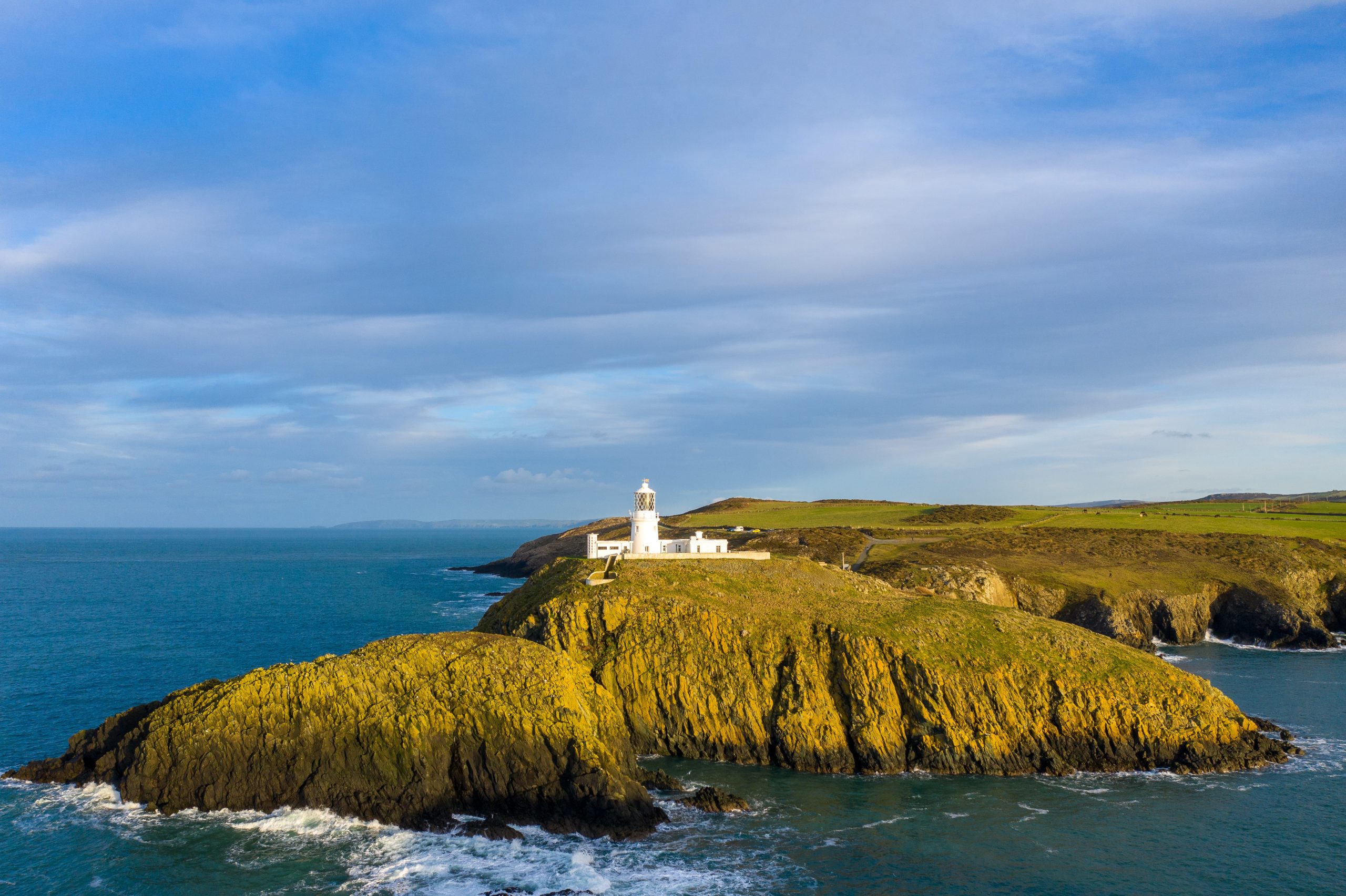
Strumble Head Lighthouse, perched on a small islet is one of the most recognisable features of the area. Built in 1908, the lighthouse’s stark white structure contrasts beautifully with the surrounding dark cliffs and blue sea.
The coastal path around Strumble Head offers breathtaking panoramic views out to sea and along the rocky coastline. The cliffs here are particularly dramatic, with steep drops to the shore below. The geological features of the area include impressive rock formations such as stacks and arches, formed by the constant battering of the waves.
The headland is a prime spot to observe razorbills, guillemots, and fulmars. The waters around the headland are home to a variety of marine life, including seals and occasionally porpoises. For birdwatchers and nature enthusiasts, this area offers a wealth of opportunities to see wildlife in its natural habitat.
In addition to its natural beauty, Strumble Head has historical significance. The area has been inhabited since ancient times, as demonstrated by the nearby Garn Fawr and Dinas Mawr Iron Age forts.
Stack Rocks and the Green Bridge of Wales
Stack Rocks and the Green Bridge of Wales are two of the most spectacular geological formations along the Pembrokeshire Coast Path. Although essential highlights of the trail, it’s worth noting these dramatic landmarks are located in the Castlemartin military training area, meaning that sometimes, this stretch of path isn’t open to the public. Hopefully you’ll be lucky!
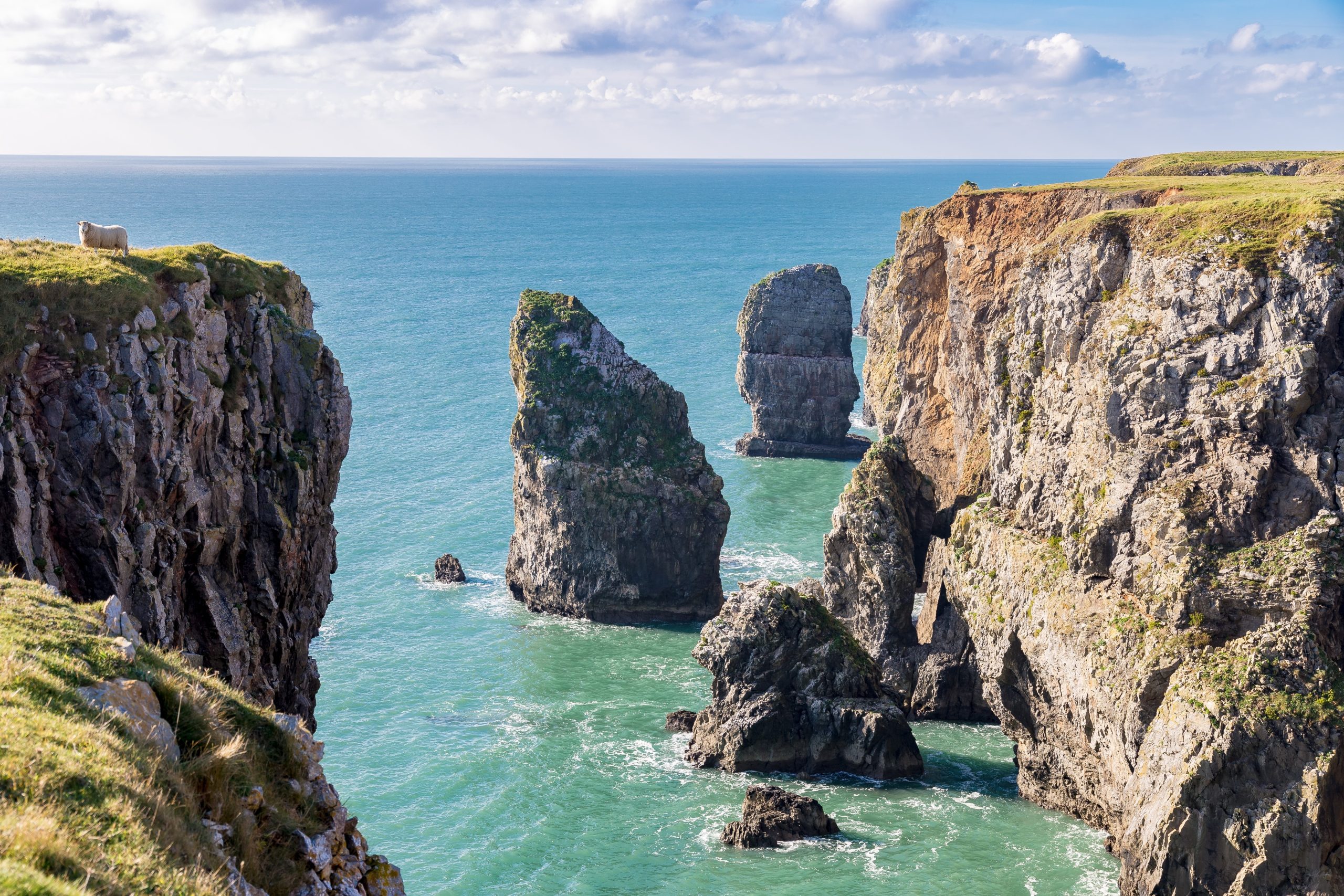
Stack Rocks and the Green Bridge of Wales are two of the most spectacular geological formations along the Pembrokeshire Coast Path. Although essential highlights of the trail, it’s worth noting these dramatic landmarks are located in the Castlemartin military training area, meaning that sometimes, this stretch of path isn’t open to the public. Hopefully you’ll be lucky!
Stack Rocks, also known as the Elegug Stacks, are two imposing limestone stacks that rise out of the sea. These vertical columns are a testament to the erosive power of the waves, which have carved the stacks from the coastline over time. The Elegug Stacks are an important nesting site for seabirds making them a popular spot for birdwatchers.
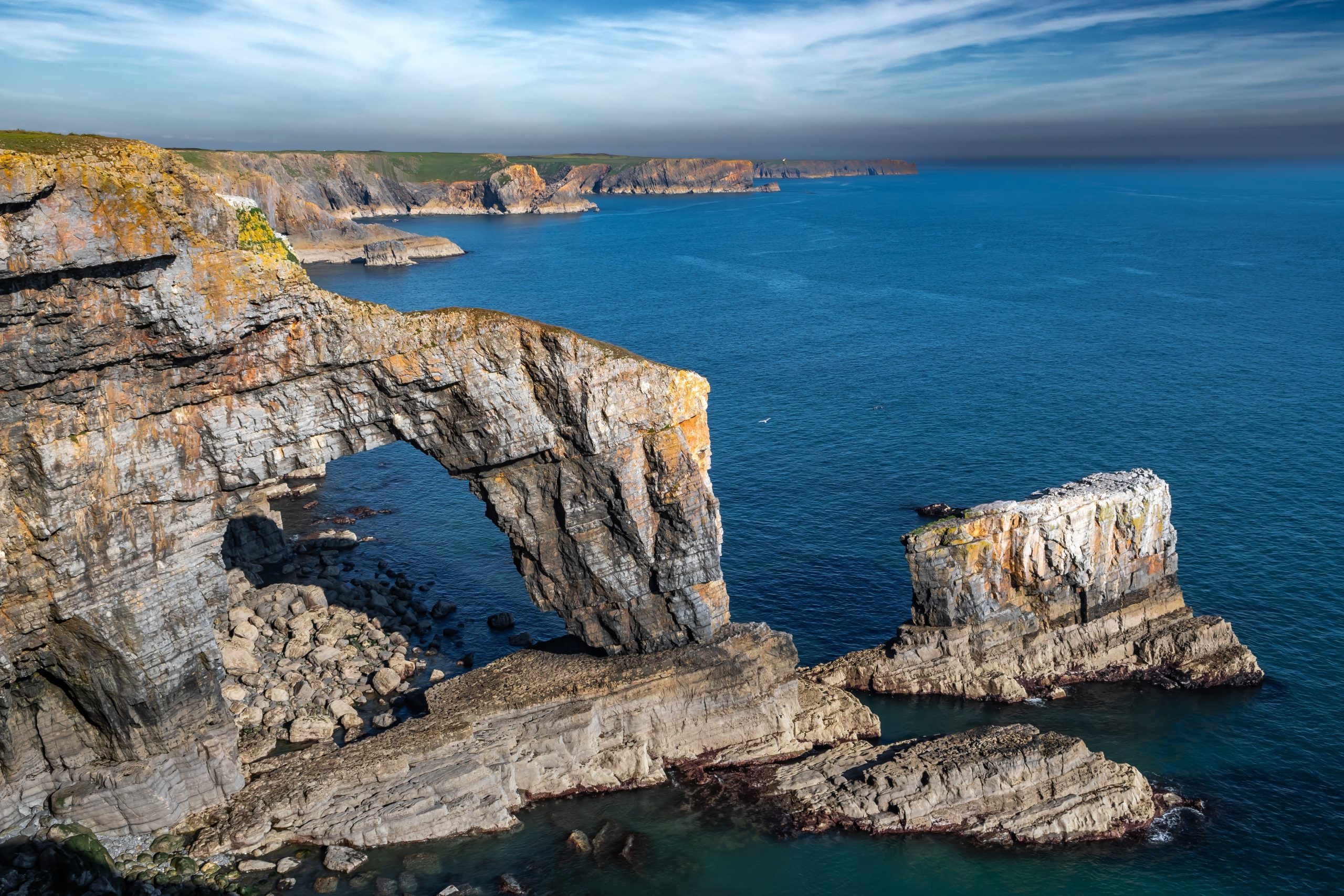
The Green Bridge of Wales is a natural limestone arch that juts out into the sea, creating a striking, picturesque scene. This massive rock formation gets its name from the lush vegetation that grows on top of it, giving it a green hue.
Walking along the path between Stack Rocks and the Green Bridge of Wales offers awe-inspiring views of the rugged coastline and the dramatic rock formations. With caves, arches, and stacks dotting this stretch of coastline there are exceptional opportunities for photography and wildlife observation.
Skomer Island
Skomer Island is a stunning wildlife reserve located off the coast of Marloes, and although not directly on the Pembrokeshire Coast Path, a visit is highly recommended as a rest day activity for anyone walking the path. The island is a haven for wildlife, particularly seabirds, and offers visitors a chance to experience the natural beauty of an uninhabited island.
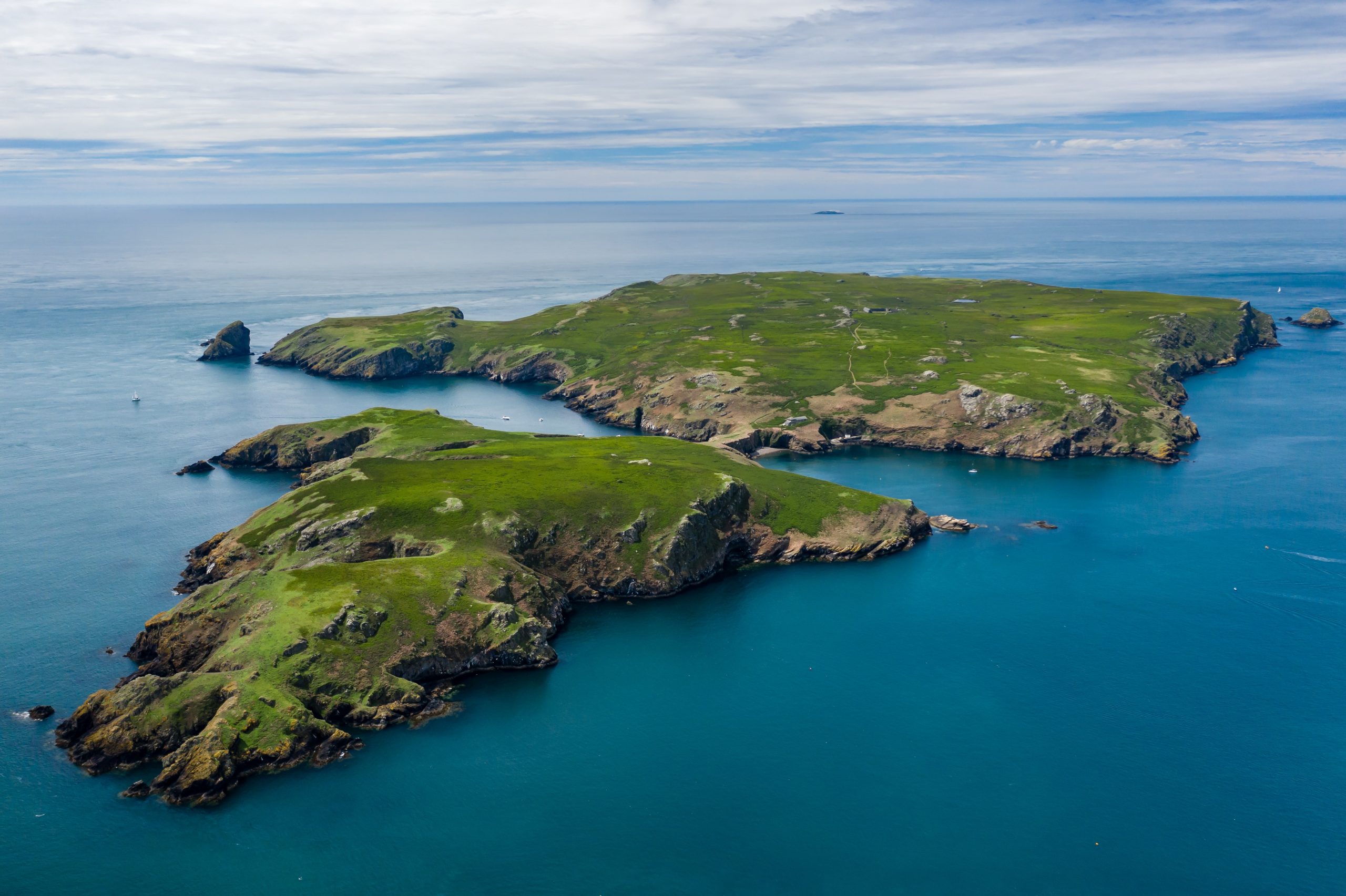
Accessible by boat from the nearby village of Martin’s Haven, Skomer Island is a designated National Nature Reserve and a Site of Special Scientific Interest (SSSI). The island’s landscape is a mix of rugged coastline, cliffs, and luscious meadow, providing habitats for a wide range of species.
Skomer Island is best known for its puffin population. These charming seabirds nest on the island from April to July, making it one of the best places in the UK to see them up close. In addition to puffins, the island is home to other seabird species such as guillemots, razorbills, and Manx shearwaters. The waters around Skomer are also inhabited by grey seals, which can often be seen lounging on the rocks or swimming near the shore.
The island’s plant life is diverse, with a variety of wildflowers, including sea thrift, bluebells, and red campion, covering the meadows in a riot of colour during the spring and summer months. These flowering plants provide a vital source of food for the island’s pollinators.
Visitors can explore Skomer Island via a network of walking trails that provide stunning views of the cliffs and the surrounding sea. The island’s remote and unspoiled nature makes it a peaceful and serene destination for nature lovers.
Solva
Surrounded by lush green hills and rugged cliffs, the picturesque village of Solva with its idyllic harbour tucked into the cliffs is one of the most impressive locations on the Pembrokeshire Coast Path. This charming destination is renowned for its pretty houses, quaint harbour, and welcoming atmosphere, making it a popular stop for walkers along the path.
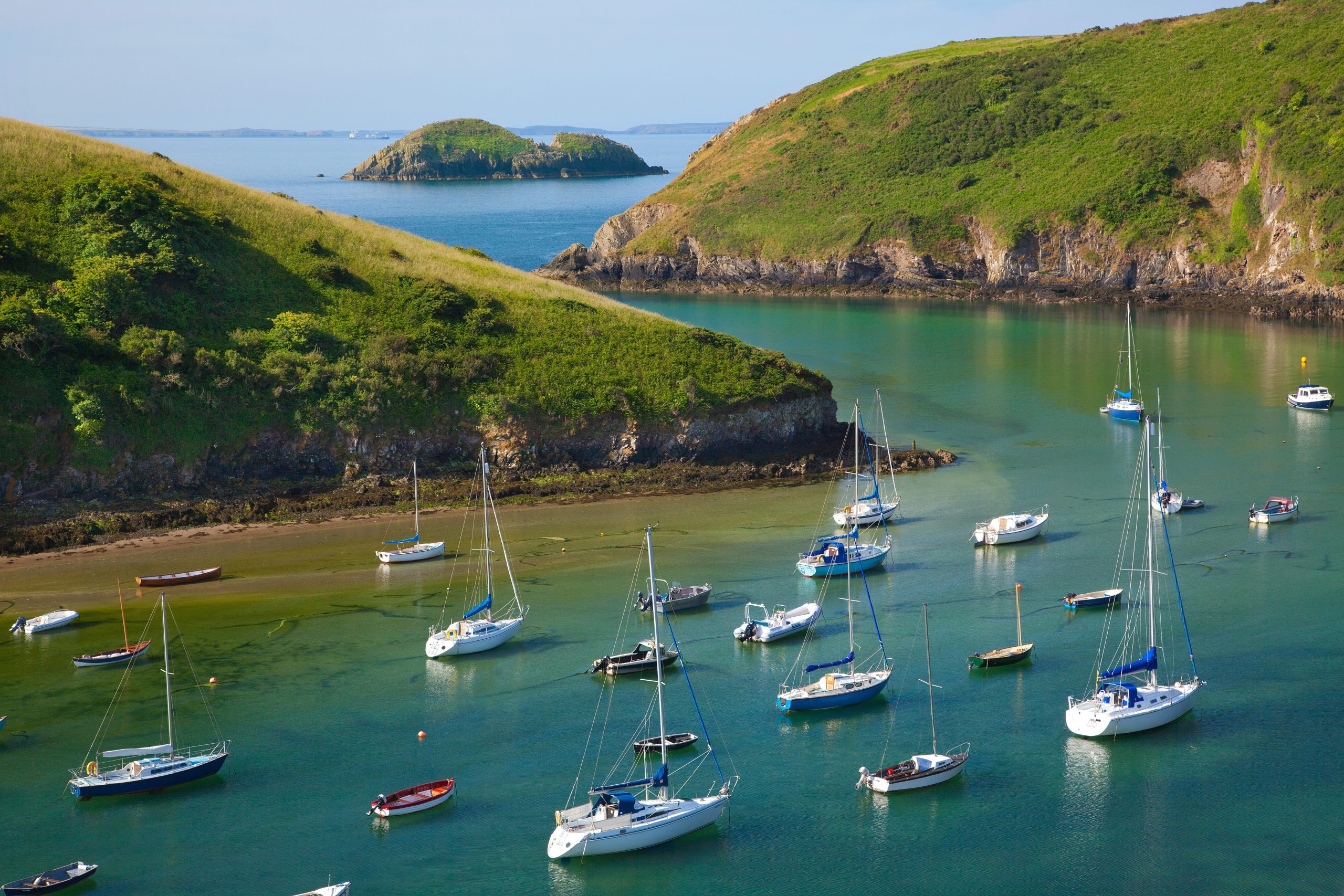
As you approach Solva on the coastal path you are greeted with stunning views of the village and its harbour. The path winds its way along the cliffs, offering breathtaking views of the bay and the surrounding landscape.
Solva’s harbour is a hub of activity during the summer months, with boats moored along the quay and the sight of fisherman at work.
The village itself offers a selection of charming shops, cafes, and galleries where you can find locally made crafts, artwork, and delicious Welsh treats. It’s a great place to take a break from the trail and enjoy some refreshments while taking in the peaceful atmosphere.
Another highlight of Solva is the chance to explore The Gribin. This scenic headland provides stunning views across St Bride’s Bay. The path leading to the headland is a really pleasant walk, with beautiful wildflowers lining the route in the spring and summer.
Tenby
Tenby is a vibrant and picturesque coastal town famed for its stunning sandy beaches, idyllic harbour, and historic architecture.
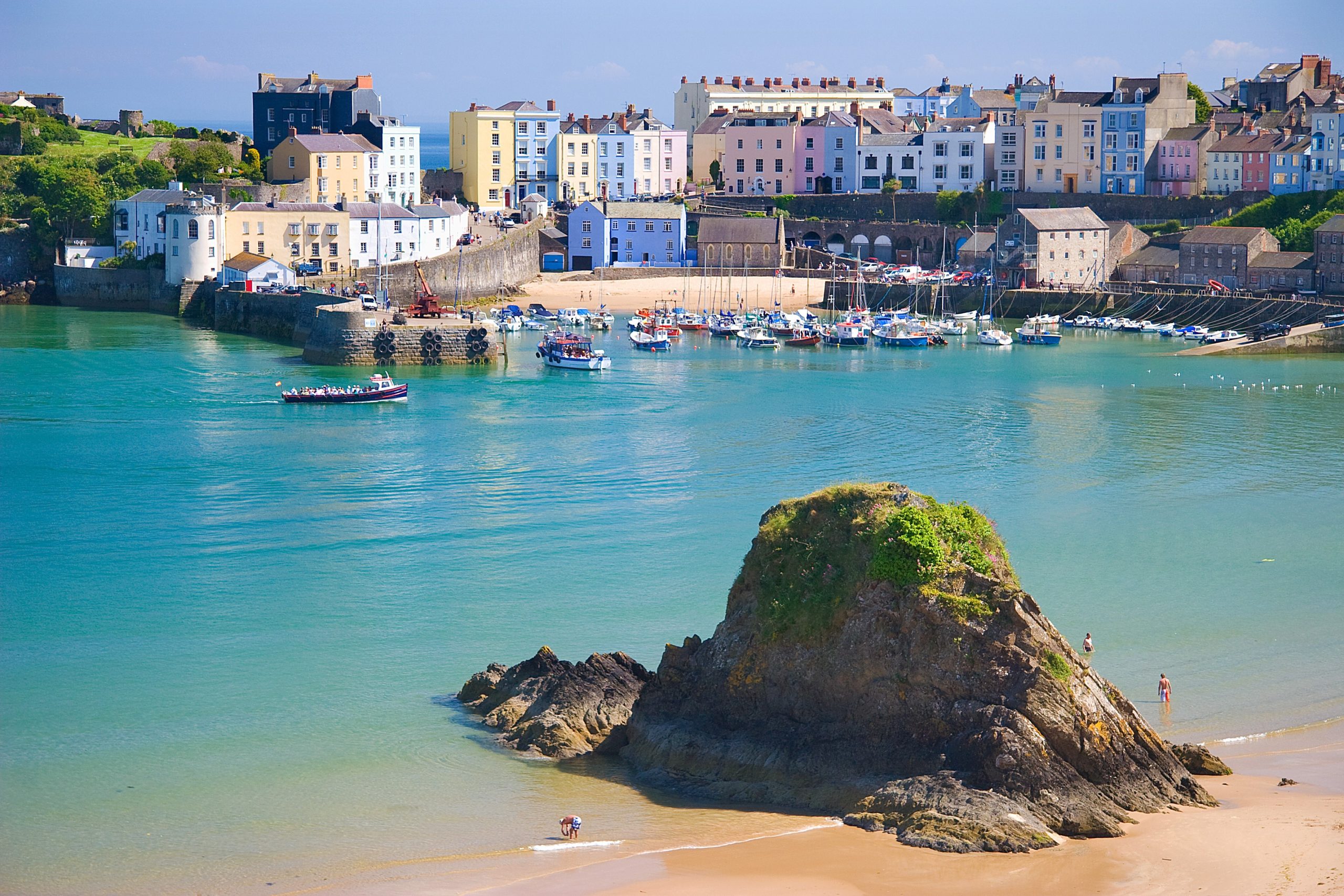
Tenby North Beach is a sheltered, sandy beach renowned for its iconic Goskar Rock, which was once part of the surrounding cliffs until centuries of wind and sea erosion took its toll. Tenby South Beach is a mile and a half long, dune-backed, stretch of golden sand that offers fabulous views of Caldey Island in the distance.
Tenby’s history dates back to medieval times, and the town’s historic architecture reflects this heritage. The medieval town walls still stand, enclosing much of the town and providing a glimpse into its past. St. Mary’s Church, with its striking spire, is a landmark in the town centre.
One of Tenby’s most distinctive features is its pastel-coloured houses that guard the harbour. These picturesque buildings add to the town’s charm and are a favourite subject for photographers.
Tenby’s lively atmosphere, combined with its rich history and natural beauty, make it a must-visit destination along the Pembrokeshire Coast Path. Whether you’re exploring its historic streets, relaxing on the beach, or enjoying the stunning coastal views, Tenby offers a memorable experience for visitors.
As well as offering the whole route, we have divided the trail into three shorter sections. The first of these is the 63 mile south coast section from Amroth to Milford Haven. This is followed by the central coast section of 43 miles from Milford Haven to St Davids. Finally we have the 62 mile north coast section from St David’s to St Dogmaels. All three are well worth undertaking in their own right, alternatively you could walk each of them in turn until you’ve completed the whole trail.
Distances can also alter with high tides and the temporary closure of the MoD firing range, meaning you could cover between 168 miles (270km) and 186 miles (300km) in completing the route.
For more information on the Pembrokeshire Coast Path and help choosing your itinerary email us [email protected] or call 017687 72335 to speak with one of our Customer Sales and Support team.